Get notified when new episodes of TheSEOFreelancer podcast go live
Introducing Mike Essex
Mike Essex is the owner of Devise Marketing offering both SEO and PPC services to his clients.
In today’s podcast, Mike and I talk about his career in the digital marketing space and how he struggled to see a long-term career in SEO/PPC transitioning to a more traditional marketing role. Spoiler: he came back to the digital world!
We further discuss whether individuals can become proficient across multiple digital channels or if it’s best to be laser-focused on one skill set. You might just be surprised as to the direction this conversation goes!
Last but not least, Mike and I talk about mental health and burnout. It’s a topic that I wrote briefly about and we both feel strongly about.
Mike’s Resource Recommendations
How to connect with Mike Essex
Mike’s personal website mikeessex.com
Mike’s client management course.
This Months Sponsor: SEORadar.com
We all know how many clients end up making changes that are bad for SEO without them talking to SEO pros first.
SEORadar puts you back in control of your client’s issues.
Whether it’s weird rendering issues that crop up or a content editor that changes titles that have been optimized for Google, SEORadar’s alerts will help you stay on top of what’s changing.
Get alerts via Slack, Email, or text message. And when that bad alert hits, you’ll have full HTML archives and screenshots to easily revert quickly.
Get Started Today with SEORadar at seoradar.com.
If you are a freelancer interested in joining me on a future episode of The SEO Freelancer podcast Please email me directly at nick@nickleroy.com
Podcast Transcription
Nick LeRoy 00:14
welcome to the SEO Freelancer podcast. I'm your host, Nick Leroy. This month I sit down with Mike SX to talk about his career in SEO, how he started. He took a seven year break, and then he has returned. So specifically, we'll talk about why he took the break. What it was that kind of sparked the interest in coming back to the digital world, and recommendations he has for other people in similar positions. Before we jump into this month's conversation with Mike, let's hear a quick word from our sponsor, Seo radar.com. We all know how many clients end up making changes that are bad for SEO. Without them talking. SEO is first, SEO radar puts you back in control of your clients issues. Whether it's weird rendering issues that crop up or a content editor that changes titles that have been optimized for Google SEO radars alert will help you stay on top of what's changing. get alerts via slack, email or text message. And when that bad alert hits, you'll have full HTML archives and screenshots to easily revert quickly. Get started today with SEO radar at Seo radar.com. Thank you again to our sponsor, and let's jump into this month's episode.
Mike Essex 01:29
Hey, Mike, thanks so much for joining me today. Thanks, Nick. Yeah, thanks for having me on. Just to start off, do you mind giving us a little bit of a brief introduction? Yeah, who are you like you said, you started in kind of in the SEO world? Do you laugh? Give us just a little bit of background of your career? Yeah, no problem. So I'm currently the founder of device marketing. We're a marketing strategy consultancy, but we also do digital marketing. So SEO, PPC and content marketing, and training as well in digital marketing, but also marketing fundamentals to prior to that I've been a bit of an SEO jack of all trades. I've done technical SEO, link building content marketing, you name it, I've pretty much done it. As well as PPC as well, I was lucky to work for an agency where they let me kind of do whatever I wanted to try, which was really good and kind of helped being a more wide rounded marketer as well.
Nick LeRoy 02:24
That's fantastic. It is interesting. And I think a lot of people place a lot of value in being able to experience each of those particular channel, just out of curiosity, before we jump into your, your career, but more what was it that made you kind of double down on SEO given that you've played in some of these other channels as well?
Mike Essex 02:45
Yeah, so probably helps if I tell you about one of my first roles, so it was a business project manager for Johnson See, like company, Johnson and Johnson company, rather. And it was your typical Junior role where you get like, 20 different things to do, and you get paid peanuts. And they're like, Okay, Mike, today, we need you to film a video or do graphic design, or write this article, or do a brochure or take minutes in a meeting or whatever, you know. But that was really good for me. I didn't actually mind that. I know people kind of criticize start a roles where they asked you to do 100 things. But for me, it was nice to kind of see, what do I actually like, you know, what have I got an interest in? Which of these things am I never gonna touch again. And I kind of narrowed down on that in terms of like, okay, the web is something I'm really interested in digital marketing is really good. Seo was kind of very early days then. But across sort of my next agency roles. I sort of learned it through Moz, and kind of really got interested in it. Yeah, I just kind of love this idea of like, beating the system and beating Google. And you don't really get that in a lot of other jobs and the community so nice as well, you know, it was really good to work in a community where everyone's kind of trying to level up everyone else's skills and share that knowledge. So yeah, I just really loved working in SEO. At that time in my career.
Nick LeRoy 04:07
Yeah, the community is by far one of the best aspects of SEO. And it's interesting the amount of people that I've talked to that are in SEO, and maybe even just like an in house individual contributor that isn't active on Twitter or isn't actively following people on LinkedIn or going to any of the meetups. And I always just continue to push them because I think there's such an opportunity to learn from smart people. And unlike some potential other careers, I would say most SEOs are willing to share there's not really a quote unquote, secret sauce. So I do 100% What I also agree with you to as you had said that there is a huge benefit to starting out in kind of a jack of all trades position, and I personally would agree with you. My first job while I always call the Kevin SEO job was officially a little bit of Everything web related as well. So I did do a little bit of coding. And when I say that it's like HTML, a little bit of PPC, and probably 92%. Seo, I think that's what really just kind of, you know, got me excited, then it led me to my career today. But I will agree with you. I think being able to touch a little bit of everything early in your career is amazing. I think once you maybe get a year or two into it, then you're better off specializing. Would you agree?
Mike Essex 05:30
Yeah, I would agree with that. And I'd sort of say in my second job role, I maybe spent too long in a company where I was still in the sort of learning what doesn't doesn't work phase. I was like, super worried about having a bad CV to the point where I would stay in roles for like, years and years and years, when you know what, I think now I'm at the point where I'm like, if I stop learning, I'm gonna quit. Like, if I'm not trying new things I'm gonna go. And yeah, definitely, in the early roles, I was just doing the same tasks day in and day out, but not really getting better at them, and not really getting any more enjoyment out of them. So yeah, I think it was that time where it was like, Okay, I need to move on to something else.
Nick LeRoy 06:09
Right. And I can speak only for myself. But I think when you first start out, at least for me, there's a certain amount of excitement of, you know, being an air quota here being a big boy, and you know, getting a paycheck, and kind of checking the box of like, I'm working. And then as you alluded to, I think with a little extra time, then it turns into, ooh, this is a little Monday. And this is a little boring. You know, I had days where I was just waiting for that clock to hit for four o'clock so that I could go home. But enough about kind of my experience, going back to your junior, so this, this junior rule that you first explained, Was that your first digital career spot? Or where did you start out?
Mike Essex 06:52
So I had a couple of personal projects that were quite fun. So when I was 13, I ran a video game website called gamers wave.com. And never got paid for, but I got a lot of games sent for free. And it was kind of just this thing I just did for the love of it. And yeah, it was just great just to I mean, it taught me a lot about kind of speaking to PR companies and communicating with them writing for the web. Seo was not really part of it back then. Definitely a lot of things I do differently. If I did it now. Had a team of other writers as well and paid them in games.
Nick LeRoy 07:29
For 13 years old.
Mike Essex 07:31
Yeah, get back from school, see what game would come in the post, try it out, write a review. Yeah, that was good luck. Good luck. Did that for a few years, went to university and we didn't even have Wi Fi in the student dorms. So it was like, Well, I can't carry on with this. I'll stop it, which was a shame.
Nick LeRoy 07:47
But once I got a quick question, because I had kind of dabbled in building sites when I was young, too. Curious what your technology stack was like, what were you using to build that website?
Mike Essex 08:00
Front Page Pro and FTP surfer?
Nick LeRoy 08:04
Oh, so you're even more advanced than I was. I was just using like Angel Fire and literally a blank page. Okay, I had to ask because I knew you're gonna have an interesting response to that. But yeah,
Mike Essex 08:16
please continue. And the site was built with frames as well. So it was pretty much dead in the water. By the time I stopped it anyway. Because there was no way I was unpicking that mess.
Nick LeRoy 08:26
But like, it's such a fun experience. And, you know, a lot of people don't know. But I used to tell people that I kind of taught myself a little bit of SEO before I even knew what SEO was just through like eBay listings. I used to go to like garage sales pick up like rough pro wrestling memorabilia, like posters of wrestling figures and VHS tapes, and go home and throw them on to eBay. And you kind of learned quickly that it was the right words in the title or the name of your auction, you know, had a correlation with how you would rank on it. And it's it's funny, because you know, that, you know, kind of at its purest form is SEO as well.
Mike Essex 09:06
That's a great analogy. Yeah, I did the same with Pokemon cards back in the day, should have kept should have kept hold of them because they're worth way more. No,
Nick LeRoy 09:13
that's that's kind of yeah, there's so many things that you know, we used to be able to see in the store. That's if only we picked all those up and never took them out of the package. Right? Yeah. All right. So let's go. Let's go back to your career. So you had that you had your, your a couple of websites or your website when you were 13. You have this junior role. You had mentioned that you had jumped to Oh, sorry. Let's talk one thing that everybody loves is in that first Junior rule. Do you mind sharing what your salary was?
Mike Essex 09:44
Yeah, it was 14,000 pound. I'm not quite sure what that is in dollars. But at the time, that was perfectly normal for starting roles.
Nick LeRoy 09:53
The dollar and pounds right now are pretty much in parity. So I bet that'd be like 14 $15,000 Somebody Yeah, yeah, at me on Twitter, if I'm completely botched on that, but still, you know, I'd love to be able to pay some bills, right? Yeah, definitely,
Mike Essex 10:09
definitely. And it was a placement year. So you basically do University for two years, and you do the placement year for one year. And then you do the final year of university. So you're only there for a short time, you just really got to maximize as much out of it as you can. And then yeah, first job at university was working for a magazine publisher, so uploading their content onto the web, and also working with their agency that they had in house as well. So supporting clients through various projects, dabbled in web design for clients. But yeah, it wasn't the best at it. But a lot of clients were asking about SEO, you know, what is it? How can we? How can we use it? And yet, that's really when I kind of got onto Mars and Search Engine Watch, and just sort of self taught myself through that and had a couple of a personal projects that I experimented on as well. Because I didn't want to just immediately try everything on on client websites. And yeah, I did that for a few years to the point where my next role after that was one where I was like, Okay, I'm going to do SEO, full time, is definitely the most enjoyable aspect of this job. And around that time, I think there was starting to be competition for s good SEO people as well. I think agencies were starting to realize like, okay, you know, there's a growing demand for SEO, we want people who've done it before, who can kind of bring up the skill level of other people in the team and, and do it at a good level without sort of being micromanaged. And that's when I moved down to the south coast of the UK to Koozai, which is a SEO and PPC agency. And yeah, that was probably the one of the best decisions I made in my career. It was great to just do SEO projects day in and day out, and really experiment with a lot of different things and to work with other people who did SEO all the time was a game changer for me, because, you know, I could constantly learn off them. I also got the satisfaction of training other people as well, I found that I really liked that aspect of you know, training up the new people in the business. And Kyuzo was great, because they let you do SEO and PPC, like some agencies sort of say you can only do one or the other. But they would gladly teach you evil one, if you did want to learn. So they basically taught me PPC from scratch. And that's probably one of my biggest services. So if I'd never gotten there, I probably never would have even touched it.
Nick LeRoy 12:32
And that's exciting. I think there's a lot of people that are split. In fact, I had a conversation on LinkedIn, because as you may be aware, you know, I'm a co owner of Seo jobs.com. And one of the debates that I have with my co founder is should we be allowing mixed positions? Yeah. Are we doing a disservice by pushing SEO and PPC jobs? Because then are you a Master of None, you know, and invoke both epic? Curious your thought I mean, now that you know, you're running, you know, kind of an agency together being able to offer many of these services for people just kind of starting out a school or looking to get into digital, would you promote learning multiple channels? Or would you say you should double down and be, quote unquote, really good or master? At one?
Mike Essex 13:24
I think it's down to individual preference, I definitely don't feel there's a downside from either option of those. And I think, you know, SEO is so specialized now that, you know, you've got people who've literally only ever done link building, but they are amazing at link building. And I kind of like that idea of like the T shape the T shaped marketer, so you kind of look at the skills you've got, and you can choose to either progressive in our organization, so go from junior, to senior to manager, etc. Or you can expand to the side and say actually, I'm going to just get really, really good at this specific skill. And the good thing is there's so many SEO jobs now that are to such a nice level where you can just be a really amazing person in analytics, for example, there's agencies that just do analytics now. And if that's all you've learned, you've still got some good career opportunities out there. Or you can be like me and be a jack of all trades, and kind of use that to pivot into like, larger marketing roles where you've got good experience of lots of different things. I mean, I do SEO and PPC services for clients now. And I don't feel like I'm offering a compromise service because I have to deliver both of those types. I can still keep up to date on the latest trends in each of those sectors, and still do a good service even though I'm split.
Nick LeRoy 14:44
Absolutely. And you bring up a really good question. This is a conversation Jeff Kenya and a buddy of mine and I were having it's kind of this idea of it doesn't ever seem taboo to you know, work across multiple channels at the beginning as we're trying to To get a foot in our career, and then kind of in the middle of it, you know, a lot of people will argue, and I think I said this earlier that you really should maybe specialize or as you're saying, you may not be able to. So there's obviously a debate to have there. But then if you want to get above this, like director, Senior Director, let's just say a CMO. Like at this point, if you want to be a chief marketing officer, you need to kind of go back to not necessarily being an expert in every channel, but you have to be aware of those best practices, you have to know kind of what works and doesn't. So it's just very interesting conversations. You know, one, you know, if you asked me a couple of years ago, I probably would have been really, bullheaded, you know, and saying that you should be really happy and one. But I think it really comes down to what are your goals, you know, if you want to be the best PPC practitioner Best SEO, and you don't ever want to become like a CMO or, you know, potentially owner, maybe, you know, going across multiple channels doesn't make sense. But if you don't want to be an SEO for the rest of your career, then I think all that makes sense. So let's jump back into your work experience. So you've gone through a couple of different roles. You were at this agency, you're becoming proficient, you probably you really have kind of figured out, you know, what you're trying to do in this career. And then, and this is one of the main reasons I wanted to talk to Mike, you left, you literally, I say you left the SEO space for seven years. Can you walk us through? What was kind of the thinking behind that was that you didn't like search anymore? Is it just a different challenge? And then I'll bombard you with other questions about why you came back. But give us a little bit of the background.
Mike Essex 16:50
No problem. Yeah, I mean, it wasn't really like one specific reason, it was more like a perfect storm of different things. So from like the SEO level, this was around the time when Panda and Penguin updates happened. And like I don't, you know, all the updates since and all the updates before, I don't feel like anything's really been as transformative as those two were. And at the same time, Google also did not provide it. So they were kind of like, Oh, we're not even going to give you your keywords in Google Analytics, which, obviously, you can get them through search console now. But there was a period of one to two years where you really didn't have any keyword data at all. And I think the combination of all of that made it apparent to me that to compete on in SEO, you couldn't really do those kinds of one day, a month, half a day a month projects that I'd kind of learned on, you really, were going to need more resources, more people, a good strong brand, and all these things to have good SEO. And the agency certainly had the resources for that. But you know, I was having like 15 to 20 clients a month at the same time, it didn't really feel like I could suddenly adapt to this new world order that was coming. And also Koozai offered me the opportunity to be their in house online marketing manager. So I'd essentially be rather than working on lots of clients, I could just work on one client. So that kind of gave me a taste of what in house life would be like. And yeah, I really liked it. You know, I like this idea of just having the one business that you focused on all the time, you know, I've only ever worked on lots of different clients all at the same time for for a long time. And I've kind of got used to that mentality of like, you make lots of recommendations, and they never get implemented. And you never really see like the other side of things and the clients perspective. So I really just wanted to get that. And also, at the same time, it felt like the SEO career path wasn't really as defined as it is now, it felt like you essentially became like, as skilled as you could in SEO, in an agency. And then you either went freelance, or you became a marketing manager, or you stayed at that level, and you fought for pay rises, but you really were kind of limited. You're capped around sort of the affairs and 35,000 a year, it didn't seem at the time, like SEO or PPC jobs, were going to allow me to get beyond that point. So it was kind of just you know, what's in the market? What jobs are there at the moment, SEO didn't look like a long term career to me at the time. Obviously, it clearly is now times have massively changed, which is great. There's more options than ever, which is really, really good to see. But you didn't really get like there weren't many in house SEO roles and there certainly weren't like in house SEO manager, SEO director kind of roles, like you get today. At least not in the area that that I lived anyway. So yeah, I went from an agency role of 20 people to work in as a marketing manager for a company with 20,000 employees. So it was kind of like a rapid shift overnight but you know, I wanted to see the wider marketing mix, you know, I didn't want to be one of those digital marketing people who says, digital marketing is the best and every other channels terrible, you know, TV is dead, this is dead. And it's like, Have you actually used those channels? No, well, you can't say that, you know, you can't make those assumptions that digital is the only game in town, if you haven't looked around a bit, and seen what the little things are like. So I wanted to get that experience. I wanted to see how other bits of marketing work, and also how SEO and PPC fit within other parts of marketing. You know, what do those client challenges look like, from the other point of view? And yeah, I got to work for a couple of really great companies doing their marketing for them, got to travel to Dubai. And, and do marketing out there, which was really, really fun experience. And see sort of different cultures, different marketing channels, to set marketing strategies and budgets and understand, you know, I never stopped doing digital entirely whilst I was in there, but it wasn't at the level of kind of how I was doing it before I still sort of kept one, one foot in the door with SEO, just keep an eye on it. See what was changing? But yeah, my main priority was to see okay, you know, what's it like being a marketing director? What are the goals of cmo has? What's it like working directly with a CEO? What kind of priorities had they got? So it's really fantastic experience? Yeah, no regrets.
Nick LeRoy 21:30
It does. It definitely sounds like an amazing opportunity. Because as you had mentioned, I suspect as you're working in other channels, you may be either you saw directly how paid search or organic search might have an impact, or, as you know, kind of a marketer yourself, you could see how this would have an impact. You know, one of the stories that I enjoy sharing with people is I had a client back in one of my previous agency roles, where we saw a brand just kind of drop off a cliff, like overnight, you know, when it came to like a year over year comparison, and we were looking at it, we were trying to figure it out, it really was tied to the homepage. And then one day, we kind of just had a conversation with some leaders of this brand. And we were just saying what happened last year, like what was different? And they were like, oh, you know, Bob, you know, Sandy, do you remember that we dropped $10 million on, you know, video, you know, or sorry, TV ads? And it was like, oh, okay, well, that would explain why last year, you had this, you know, big jump, and we weren't able to replicate it, because that went away, you know, and those are the types of things that if you're not necessarily thinking outside of broader search, but you know, the bigger marketing aspect of how do we get your brand out there, and how that can turn into additional, you know, search visibility and search demand. And just like I said, it's very interesting, I can appreciate that.
Mike Essex 22:58
Definitely. And you're competing with the budget against all the other channels the business is using. So the more understanding you can have of those channels and the ROI of them and how they work, the more potential search budget, you can get, you know, if you can prove that the CPA is better for your particular channel, and understand how the other ones work, then you can obviously fight for more budget, and fight for better rates. So it's great to have that bigger picture thinking as well.
Nick LeRoy 23:26
100%. So now I feel like the million dollar question. We've already let the cat out of the bag, you're back, you're doing you're focusing on digital, so seven years of wave, but like you said, you kind of kept your toes in it. Because once you get the taste of search, you never can let it go. What was that? Was it kind of another epiphany where you're like, I need to make this switch because this seems a little bit more sustainable, where maybe the seven years prior, it was not or walk us through just a little bit?
Mike Essex 23:56
Sure. So I think one of the original reasons I left SEO as well was I was getting a bit burnt out of kind of trying the same things over and over. And having that time away kind of renewed my passion for search as well. I saw the amazing things people were doing with digital PR, all the great case studies people were sharing on LinkedIn and Twitter. And that kind of sparked that demand again of like, okay, you know, I want to try some of these new things people are doing companies that were certainly more prepared to do the budgets and the resources that are needed now, which I was kind of scared about. At the time that I left was maybe they wouldn't want to do that. And the whole SEO industry had really kind of matured to a point where it's very, it's taken very seriously, you know, lots of levels in an organization. So it felt like a good time to come back. I mean, when I first went freelance, I certainly had a range of services I wanted to offer including marketing strategy as well. But because when I was in the SEO industry I'd spent spent so much time building up a personal brand by speaking at conferences, by doing blog posts by doing videos, people still knew me as an SEO guy. So even seven years later, when I came back, it was like, oh, Mike's really good at SEO, you know, he's the person you should go for. And I still had a good track record that I could promote myself with. So it made sense. I kind of resonated me and Tom Critchlow is when Harry said that when he came back, he worried that SEO was going to be below him. And I can definitely relate to that. Because I obviously spent seven years in a senior marketing manager role. I didn't essentially want to go back to do the exact same thing I was doing before. But that's why I built strategic consulting into the SEO offering that I have now and made it more about okay, you know, how can we make it work with the rest of the marketing options you've got? And what is your marketing strategy? You know, what are you actually trying to achieve? And how can we use SEO to to help you with that?
Nick LeRoy 26:03
I'm glad that you brought that up. People may have listened to my interview with Tom Critchlow. And he says exactly what you're saying, you know, he was worried about coming back and that he was gonna be stuck with SEO audits. And that wasn't a good representation of his experience his value, you know, he had just come back from Google. So really, there is this? I don't even know if it's like a new coined term, but the strategic consulting, you know, that's what Tom says he's doing, you know, Mike, you're saying this, I know, Eli Schwartz is, is saying this. And I think really what it is, is that's kind of distinguishing SEO and digital marketing as a whole today, versus as you alluded to seven years ago, it's like Seo was kind of your title tags and some links, and it was almost like process driven. So it's really interesting to think of that, and like you said, being able to go freelance, how do you make sure that you're able to communicate that broader value that you're able to provide, versus just going back and saying, I'm an SEO, forget everything I had done for seven years. So with that, I'd love to dig a little bit deeper, because I think you have a little bit of a different story about first you went freelance, you didn't decide, I'm gonna go back to SEO, I know all these people in the agency world, you probably could have had your choice of in house gigs. You chose to go freelance, which is why you're on the podcast today. But as far as I understand, in our previous conversation, you know, you didn't have you know, six figures saved in the bank, you didn't have 20 customers that you already were working on, you kind of just flipped the switch and jumped in. Can you walk us through that journey a little bit?
Mike Essex 27:46
So yeah, my story was a little different. I mean, I always wanted to wait for the perfect time to go freelance where like, say, I had the money in the bank, and I had the client list ready to go. But I was made redundant in my role. And I got given three months notice. So the UK is actually really good for that. Like, I think in the States, you guys don't get the best notice periods. But yeah, luckily, a lot of digital roles will give you one month, maybe up to three months of notice. So it was sort of like, okay, I don't have this dream scenario, you know, I had 20 grand of debt. My wife's disabled, so we only were a single income family. And I've got a mortgage to pay. So it didn't really have the dream situation. But it was like, Okay, I've got premiums notice, I'll apply for jobs, but also look for freelance work and see what kind of comes in and what's the best option? And yeah, I did find that I got freelance clients fairly quickly. And once I got a couple of those, and it was like, Okay, I'm gonna commit just to this freelance seems like it might work. And if it doesn't, at least I've tried it, you know, I always wanted to try it, so why not? So I think there's always going to be people who are thinking, you know, I'd love to go freelance, but I need to have all of my ducks in a row. And life isn't really like that. Doesn't always work at that you've got everything perfect, but there's no reason. You know, I sort of see SEO as being like, easy mode of going freelance, which hopefully doesn't offend anyone. But what I mean is, because it's a retainer based model, you essentially, you know, once you've got those clients, and they generally will stay until there's an issue where I say a graphic designer has to go out and get work every month, or, you know, not every other industry has this nice luxury of retained clients and consistent work. So, again, there was that element of like, once I get the clients in, I should be fine as long as I keep delivering a good quality service. And I've had pretty much the same clients for a year and a half to two years. So it does work.
Nick LeRoy 29:50
Well, and to your point there I mean, that is one of the best parts of you know, SEO or digital retainers is as long as you can provide that ROI. There's Got a reason to be able to, you know, move to someone different. Whereas I think your example of graphic design is a perfect example. You know, some people have, you know, retainers, but they're not going to be as large as you know, a marketing budget, you know, and very likely they are going after project after project, which would be exceptionally stressful for me personally.
Mike Essex 30:23
I agree. Yeah. I don't know how web developers do it, either. Because the amount of scope creep and timeline changes on that kind of project, it would keep me up at night, all the time.
Nick LeRoy 30:33
Yes, yeah. Worse, you know, we're dealing with how come we're not ranking for this term? Or why did it happen overnight, right. So one of the topics that I want to talk about with you is you're a big proponent of mental health, and attempting to balance kind of the pressures of freelance life, can you share with us how you go about just prioritizing mental health while still giving that great service to your clients?
Mike Essex 30:58
Absolutely. So my previous job before I went freelance had a four and a half day working week. So that was something I kept straight away. I knew if I go straight into a five day week, I probably would never dial it back again. So I really wanted to keep that from day one. It's not quite a four day week, like people recommend, but still having that early finish on a Friday means I've got more time for life admin, or if I want to do something fun. I've got that there. I also generally try to work with clients who understand that I don't work weekends or out of hours unless something's absolutely critical. And again, 99% of SEO work doesn't really have that out of hours emergency or it shouldn't do you know, if it does, you might want to question why your clients are putting that specific pressure on that it has to be solved. Right, that time, some clients just love to have conversations out of hours. And they're not the kind of client for me. And the other thing I realized was, you know, I started with a very rigid, eight to five, working day, just because I was worried, you know, if a client rang me, I wanted to make sure I was available all the time, because they were the hours they worked. And over time, I've realized that actually, I don't have to be at the end of the phone all of the time. You know, clients can wait, if you were in a day job, and you were in a meeting and a client phoned you, you wouldn't be there straightaway. And again, so some days, I'll work seven till 11. And then take a two hour gym break or walk the dogs or have dinner with have lunch with family or friends. So again, it's kind of realizing that if you're in freelance, you don't necessarily have to stick to the nine to five, or the eight to five clients can wait around you. It was really transformative for my wife as well, Marie, because of her disability, she found working in traditional employment hard, but being freelance meant she could come back to it on her own terms, she could set our own hours depending on our energy levels that day. And she didn't have to jump back into an eight hour day. And yeah, the clients love her. They love the work she's putting out. And you know, it's really helped her mental health as well. So for both of us, it's been great. And for me, it's been nice having someone else to talk to when I'm at work, and to kind of share the stresses of it, where we're a husband and wife agency, which you don't really see very often, but it's nice to kind of share that and know that she's got my back and I've got hers.
Nick LeRoy 33:28
I love, love, love, love all that. That's one of my biggest mistakes in my previous agency career as you had kind of alluded to, I'm sure you have plenty of your 6070 plus hour weeks, you know, you miss quite a few dinners with the family, you know you're traveling and it seems kind of exciting in the time but really it's just like a mental health drag. And I think to your point you bring up you know this nine to five and I've kind of coined it or heard other people call it and I'm using air quotes here, the nine to five freelancer you know, the one of the biggest benefits, as you had alluded to Mike was you can kind of control when you're going to work. You know, I personally have talked anything tweeted about how much I enjoy shopping with senior citizens on Tuesdays at 11 o'clock, you know, for my groceries. Because the I get to kind of go around when the when it's not quite as busy. But I do think that that is really hard. And one of the things that you learn in the freelance life of balancing and my button seats simply because I've been trained for you know, 510 15 years of work is nine to five, or are you there doing meaningful work? And what I personally have tried to approach it as if I'm not getting paid. Why am I here? Because that is like one of the benefits that I get, you know, that's time with my face. Family, you know, with my kids or, you know, going out in networking even, you know, and I think that's just a huge benefit to freelancing, and not a lot of people are being as big of an advocate of what can be some of those mental health benefits that, you know, I tried to be online, and I don't mind you have been really good, at least from what I've seen on like LinkedIn of being a promoter of that. So thank you for pushing that too.
Mike Essex 35:27
Yeah, no problem. And the funny thing is, as soon as you leave a company, all those late nights and all those extra things you did, they don't mean anything. So you know, they're great at the moment. They solve a short term problem, but they don't really help with long term career.
Nick LeRoy 35:43
So very true. Yep. I don't miss driving one hour each way every single day. It's amazing. The car the amount of miles I have not driven since going freelances is impressive. So like to kind of wrap this up a little bit. I like to ask all my guests just any recommendations you have for freelancers, whether it be specific books or courses, newsletters, or even individuals that you would recommend they follow? Do you have any recommendations?
Mike Essex 36:14
Yeah, no problem. So if you're looking to explore life outside of SEO, the marketing meetup by Joe Glover is a really good community where they have marketing talks on a whole range of different things. I also found that the ad contrarian and Dave trot are really good blogs as well that talk about advertising and reaching people. And again, they'll give you some of that experience of outside SEO and stuff that's really useful. A lot of SEOs really love Dave Trott. And he actually spoke at Brighton SEO. So he's really, really good figure. And for me, the million dollar consultant book was really useful when I started out, I've not quite got to value based pricing, like Alan would recommend, but it has some really good stuff about building a brand and establishing yourself and having kind of a scarcity, a scarcity mentality where the work comes to you, because of the time you've put in and the brand that you've built. So you can pick the best clients for your mental health.
Nick LeRoy 37:12
There's a pattern here at people that I've been interviewing lately, and that everybody has been reading the million dollar consultant. It's a book that I have read, and I'm not a huge reader. And you know, Tom, and I kind of joke because Alan kind of has a brass she'll personality a little bit. I know, I've talked to you like Schwartz, who has actually talked directly with Alan quite a few times. But it's interesting, you know, that book really does change how you view things. And even if you're not going to adapt everything that he tells you to do, I think it really does help you at least consider, you know, some alternatives to what you're doing. And many of them, at least for me, you know, have worked out in the positive. So definitely recommend that. And I'm going to look into those other books and resources that you recommend as well. I'll make sure to link those in the description below, too. But Mike, thank you so much for your time. Really appreciate you joining the podcast today. For people that are listening, can you share with us the best way for them again, touch with you?
Mike Essex 38:14
Sure. So I'm mostly active on LinkedIn, search for my Catholics, and I'll be the one that works for device marketing. Or you can visit Mike essex.com to sign up for my mailing list as well.
Nick LeRoy 38:26
Fantastic, and I will make sure that all of that is included in the show notes below. But Mike, thank you again. Really appreciate your time. And we'll catch you next time on the SEO freelancer.
Mike Essex 38:39
Thanks, Nick. It's been fun





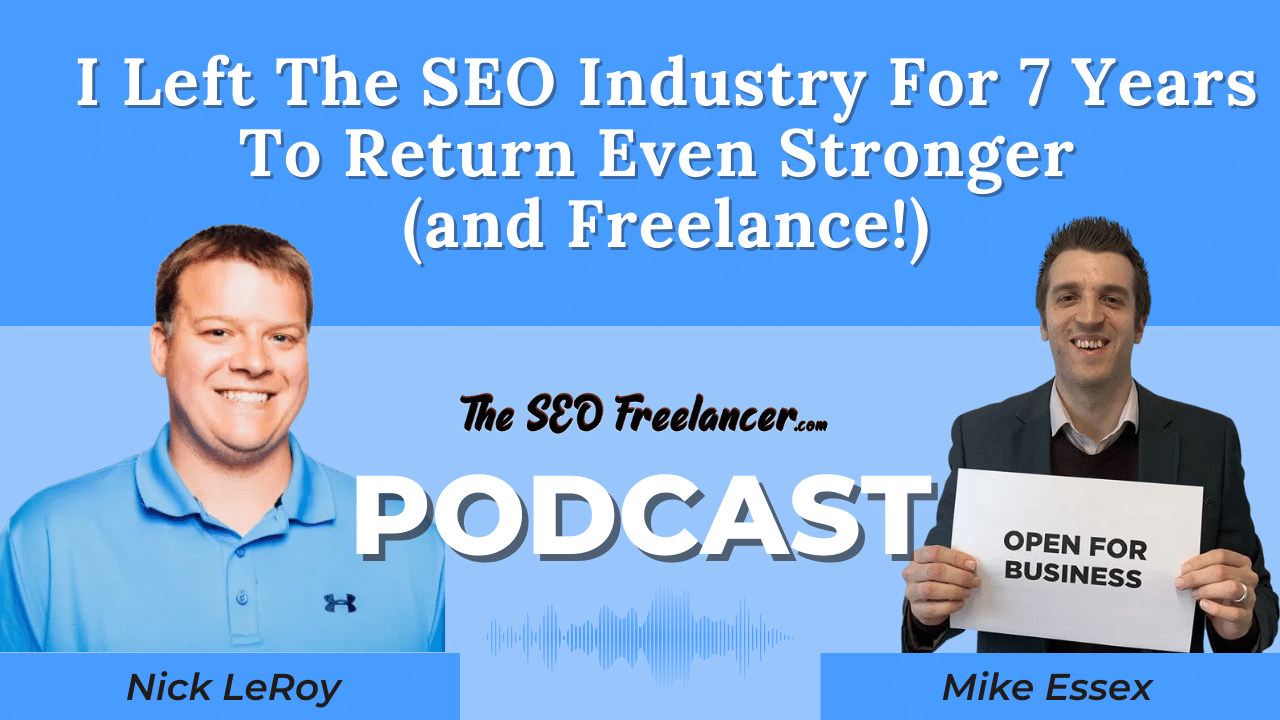


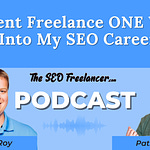
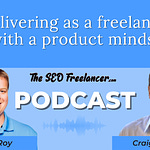
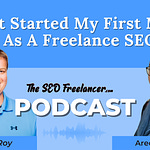
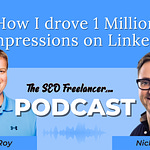
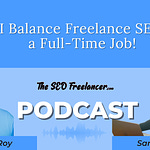
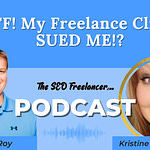
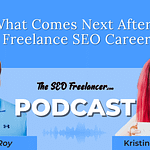
Mike Essex: I left SEO for 7 Years Only To Return Stronger (and freelance!)